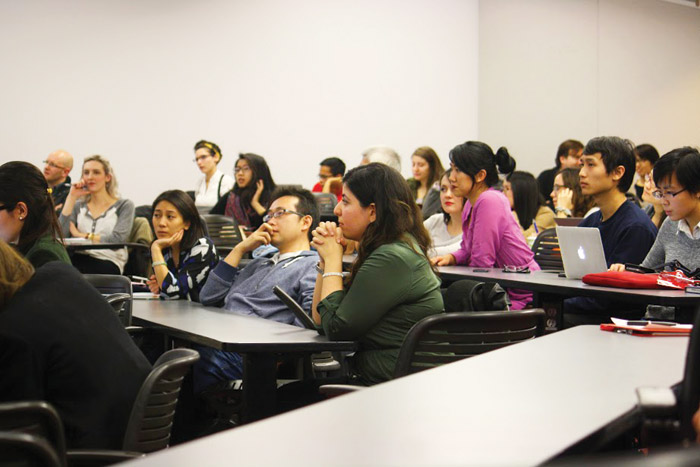Last Wednesday, the Asia Pacific Law Association of McGill (APLAM), an association of McGill Law students with an interest in the legal systems and cultures of the Asia Pacific region, hosted an open panel discussion on the current democratic crisis in Hong Kong.
Panelists at Wednesday’s event included speakers Yves Tiberghien, associate professor of political science and director of the Institute for Asian Research at the University of British Columbia (UBC); Marie-Eve Reny, assistant professor of political science from Université de Montréal; and Jakub Adamski, course lecturer in the Faculty of Law at McGill University. The panelists covered topics such as the media coverage of the crisis, reasons for the initiation of protests, expected outcomes of the protests, current political tensions in Hong Kong, and police tactics that are unique to the 2014 protests.
On Sept. 22, Hong Kong citizens staged ongoing pro-democracy protests concerning the 2017 election of Hong Kong’s next Chief Executive. In late August, the Chinese government stated that as a Special Administrative Region of China, Hong Kong would be able to elect the next Chief Executive from a pool of candidates selected by the Central Chinese government. The pro-democracy protests were originally instigated by members of the Hong Kong Federation of Students and are being continued by the Occupy Central advocacy group for social disobedience in Hong Kong.
According to Ramanujam, the pro-democracy protests will lead to a change in Chinese party law.
“I think that in the immediate future, nothing dramatic is going to shift in Hong Kong,” Ramanujam said. “However, I do think [that China is making an] effort [… at] democratizing the party and the party’s behavior—making it more transparent, more accountable, and then going towards some sort of increased participation in terms of people.”
Professor Tiberghien identified the root causes of the Umbrella Movement, as the protests have been called, as the perception of rising inequality and decreasing opportunities for young people, concern over the ‘mainlandization’ of Hong Kong, frustration with the lack of innovation and proactivity in addressing new social, environmental, and economic problems, and a desire for the establishment of a “real democracy.”
According to Adamski, it is important to recognize that Hong Kong is a unique region when seeking to understand the events surrounding the 2017 election. He discussed the region’s history as a hub for Asian Pacific trade and its current economy.
“Manufacturing has ended effectively as a large [industry,]” Adamski said. “There is a lot of money coming into Hong Kong but many people are not profiting from that, hence the ‘occupy’ language [….] It’s about political rights, but it’s also about the growing perception that, effectively, Hong Kong is becoming more and more [of] a plaything, if not for what used to be Western foreigners, now for Chinese wealthy foreigners.”
Reny predicted that the Hong Kong protests will not come to a violent end, the way events at Tiananmen Square did in 1989. However, according to Reny, police tactics such as group detentions, pepper spray, and tear gas had not been utilized prior to the 2014 protests. This change in tactics, in combination with the lack of organization among protesters, leads to uncertainty as protesters continue to occupy the streets of Hong Kong.
“It’s not clear what [the Umbrella Movement’s] future plan of action is going to be,” Reny said. “[As] the sit-ins on the street go on, that uncertainty sends Beijing and the Hong Kong government […] signals that they shouldn’t worry too much about the protestors.”
In their concluding remarks, panellists agreed that the current unrest in Hong Kong is a by-product of a crisis that is both social and economic. Although panellists shared the opinion that the ongoing protests will not affect an immediate change, they predicted that a slow shift in party policy will occur.









